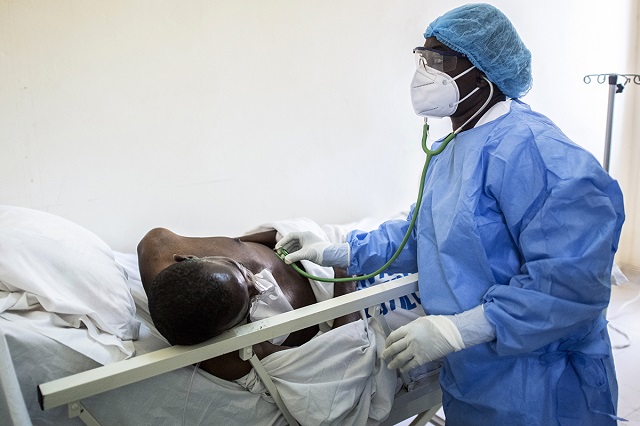By Denis Jjuuko
There is a hospital in my neighborhood that is usually not very busy. Over the last few days, you can see people getting their intravenous treatment in the parking lot. The hospital is near a popular bar, if you are not a keen observer, you may think that the vehicles parked alongside the road are for the bar patrons. Yet the bar is closed. The cars belong to patients and their caretakers.
Another photo trended over the weekend over a guy on oxygen as he sat in the car. I am not sure where the photo was taken but I wasn’t surprised. Pharmacies in Wandegeya have queues that rival those of young people lining up at offices wherever they have heard of a job opening!
The real COVID-19 wave is finally here. Every day, you hear of somebody you know who has died. It is gloom everywhere. However, I believe this is the time the government should take the bull by the horns.
Vaccinations
There are very many people right now who are interested in vaccines and the government officials must be working the phones to find them in the required quantities. We made some mistakes by ordering a few the last time out. It is time to have them now available in the required quantities. And when they are available, they should have them available everywhere just like those of polio and measles. Members of the G7 meeting over the weekend pledged to give out a billion vaccines to developing countries. The Ugandan leadership should ensure that we are on the priority list with the right quantities. It is time those responsible for managing the country showed what they are made of. Those responsible for communication need to double their efforts too to ensure that the right messages are widely available.
Tests
On average, on the fliers I am seeing, the cheapest COVID-19 test in Kampala is Shs70,000. Assuming the average Kampala household has six people, that is Shs420,000. This doesn’t include the transport to the facility or the transport for the health worker to come to your home. Some facilities are charging Shs200,000 for a PCR test! That would be Shs1.2m for a household. These amounts are out of reach for most people. This means that many people who need to be tested will not go for tests. They will resort to taking each herb that is being circulated on social media. The health cost of steaming and taking all sorts of stuff people are selling in the name of a cure of COVID-19 is going to be very high. Yet last year, people like Alibaba founder, Chinese billionaire, Jack Ma donated lots of test kits. What happened to them? The government should come in and subsidize the cost of tests so that those who need them can have them. They can also widely offer them for free by setting up testing centres everywhere. COVID-19 tests shouldn’t only be for those going to attend parliamentary meetings.
Home based care
The Ministry of Health has come up with a treatment regimen that people can order over the counter in pharmacies for those suffering from mild COVID-19. Such drugs include azithromycin, amoxicillin and zinc among others. The cost of these drugs is high. In some of the pharmacies in my neighbourhood, a 20-tablet pack of a combination of zinc and vitamins D and C is being sold at Shs45,000 while a dose of azithromycin is at Shs12,000. I saw people paying upwards of Shs200,000 for their COVID-19 patients. I must admit that the cost might be lower in some parts of Kampala such as downtown Kampala but you get the drift. Again, government must show leadership and subsidize these drugs they are recommending people to take at home. They can also make them widely available for free. A simple database linked to the national ID can be created to ensure that people don’t take more than at least one dose to ensure equity.
Subsidize ICU charges in private hospitals
Without the private hospitals including those owned by religious institutions, Uganda’s healthcare system wouldn’t be worth the ink of this article. Intensive Care Units in private hospitals are charging an arm and leg. I wouldn’t call them greedy like most people are doing because the owners instead of investing in apartments like most Ugandans with money, they went into healthcare. Without them, we wouldn’t do much. Some acquired loans at more than 20% per a year to get the beds and equipment. So as businesses, they want a return on their investment. Who would blame them?
Government however can subsidize what private hospitals are charging COVID-19 patients and even those suffering from other diseases.
The beds aren’t too many and government can easily pay some of the bills for such patients. The same can be done for those in High Dependence Units. Government can pick the allowances of healthworkers in private ICUs and HDUs, supply medical oxygen, and such other stuff.
The government cannot watch as families sell all their assets to clear bills for people who have even died. Sometimes the assets sold aren’t even enough to clear the bills.
The writer is a communication and visibility consultant. djjuuko@gmail.com










